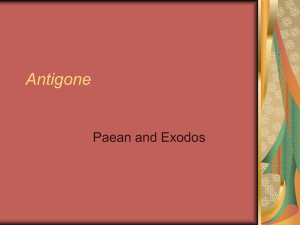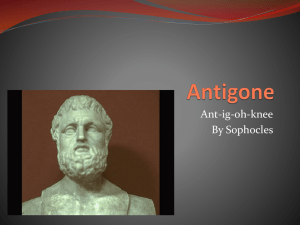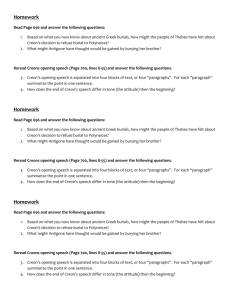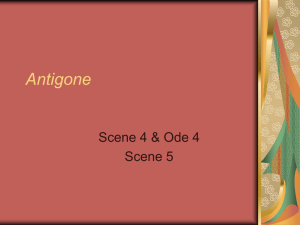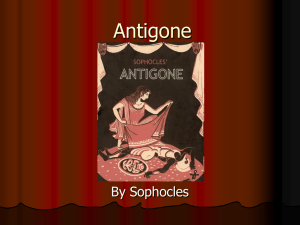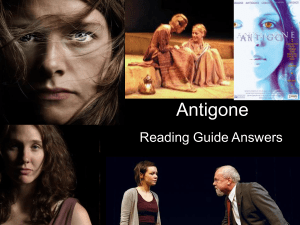Antigone Review Questions: Study Guide & Analysis
advertisement
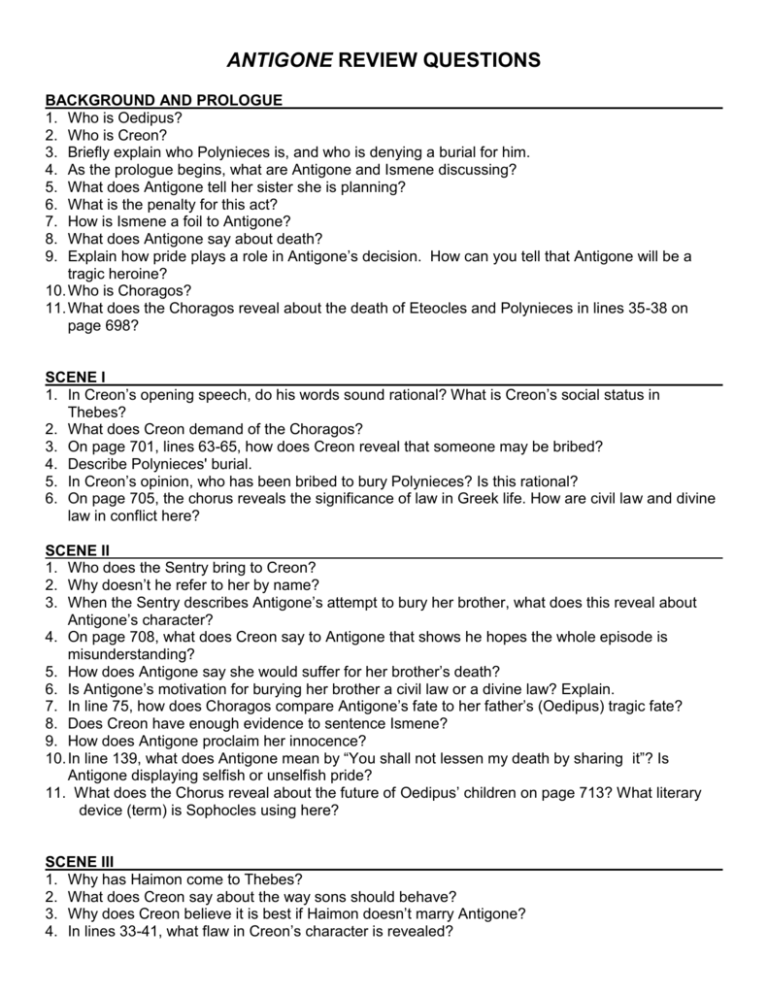
ANTIGONE REVIEW QUESTIONS BACKGROUND AND PROLOGUE 1. Who is Oedipus? 2. Who is Creon? 3. Briefly explain who Polynieces is, and who is denying a burial for him. 4. As the prologue begins, what are Antigone and Ismene discussing? 5. What does Antigone tell her sister she is planning? 6. What is the penalty for this act? 7. How is Ismene a foil to Antigone? 8. What does Antigone say about death? 9. Explain how pride plays a role in Antigone’s decision. How can you tell that Antigone will be a tragic heroine? 10. Who is Choragos? 11. What does the Choragos reveal about the death of Eteocles and Polynieces in lines 35-38 on page 698? SCENE I 1. In Creon’s opening speech, do his words sound rational? What is Creon’s social status in Thebes? 2. What does Creon demand of the Choragos? 3. On page 701, lines 63-65, how does Creon reveal that someone may be bribed? 4. Describe Polynieces' burial. 5. In Creon’s opinion, who has been bribed to bury Polynieces? Is this rational? 6. On page 705, the chorus reveals the significance of law in Greek life. How are civil law and divine law in conflict here? SCENE II 1. Who does the Sentry bring to Creon? 2. Why doesn’t he refer to her by name? 3. When the Sentry describes Antigone’s attempt to bury her brother, what does this reveal about Antigone’s character? 4. On page 708, what does Creon say to Antigone that shows he hopes the whole episode is misunderstanding? 5. How does Antigone say she would suffer for her brother’s death? 6. Is Antigone’s motivation for burying her brother a civil law or a divine law? Explain. 7. In line 75, how does Choragos compare Antigone’s fate to her father’s (Oedipus) tragic fate? 8. Does Creon have enough evidence to sentence Ismene? 9. How does Antigone proclaim her innocence? 10. In line 139, what does Antigone mean by “You shall not lessen my death by sharing it”? Is Antigone displaying selfish or unselfish pride? 11. What does the Chorus reveal about the future of Oedipus’ children on page 713? What literary device (term) is Sophocles using here? SCENE III 1. Why has Haimon come to Thebes? 2. What does Creon say about the way sons should behave? 3. Why does Creon believe it is best if Haimon doesn’t marry Antigone? 4. In lines 33-41, what flaw in Creon’s character is revealed? Should citizens have the obligation to obey the state (gov’t) in all things? How does Creon feel about a woman’s role in society? How is pride a factor in Creon’s chauvinistic view of women and politics? In lines 69-79, Haimon is trying to reason with his father. What does he try to make his father understand without insulting him? 9. In your opinion, was Antigone breaking a civil law when she buried her brother? Was she breaking divine law (law of the gods)? 10. On page 719, Creon and Haimon argue about “rights” given to people by “God” or Zeus. Who is rational, and who is irrational? What is ironic about the argument? 11. In the midst of rage, what decision does Creon make regarding Antigone’s fate? 12. What literary device is Sophocles using in line 136? 13. How is Creon’s rage similar to a child’s temper tantrum? What does his tantrum cause him to do? 14. In Ode3, what does the chorus say about love? What literary device is being used in both stanzas? 5. 6. 7. 8. SCENE IV 1. Describe the atmosphere in Scene IV. 2. On page 723-724, in what lines does Antigone reveal the tragedy of her punishment? 3. When Antigone says, “The blasphemy of my birth has followed me.” What does she mean? 4. Why doesn’t Creon have Antigone stoned? Is he obeying divine law or civil law? 5. As Antigone is led away by the guards, what does she reiterate was her motivation for breaking human, or civil law? 6. In Ode 4, the chorus refers to “untiring destiny”. What is meant by this common theme in Greek tragedy? SCENE V – EXODOS 1. Who is Teiresias? 2. Describe Teiresias opening lines. How are they different from that of Creon? 3. In lines 23 and 24, Teiresias describes the way he sees. What does he mean? 4. Describe the prophecy of Teiresias. 5. How has Creon become a tragic character? 6. In lines 33-36, Teiresias states one of the themes of the play. What is it, and how does it affect Creon? 7. Read the conversation between Creon and Teiresias. How do their ideas of wealth and wisdom differ? 8. What does Teiresias tell Creon about his fate and the fate of Thebes (pg. 730)? How is this ironic? 9. Creon’s profound statement in lines 92-94 is ironic and tragic. What does he come to realize? Is it too little, too late? Explain. 10. What does Creon decide to do to try to redeem himself in the eyes of the gods? 11. What has happened to Haimon? 12. Summarize what the messenger tells Eurydice. 13. What is Eurydice’s reaction to her son’s death? 14. What does Creon say he hopes will come quickly following his wife’s death? 15. Creon’s final line in the play reveals his tragic flaw. What is his tragic flaw? 16. Translate Choragos’ final line into your own words. 17. There are several conflicts in the play. Describe 2 involving pride and law. 18. How is Antigone a tragic heroine? How is Creon a tragic hero?


